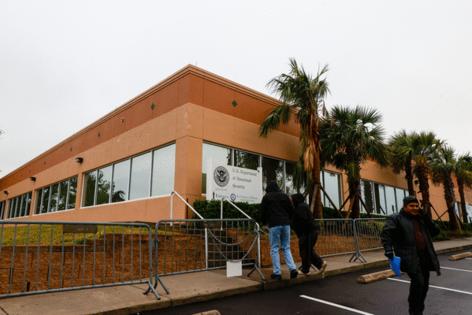Florida immigration meetings bring new risks of arrest, deportation
Published in News & Features
Immigration interviews are suddenly moved up, sometimes by phone, or with last-minute notice by letter. People in legal limbo and with deportation orders are caught off guard. They show up thinking it’s just another annual check-in, a routine interview. Instead, they’re arrested and deported within days.
Advocates and immigration attorneys said this bait-and-switch has become more frequent. They say these actions could weaken core legal protections and create more uncertainty among the community.
The U.S. Department of Homeland Security said the agency is working aggressively by addressing “vulnerabilities” in immigration policies, an effort that has deep support from those who want tighter controls on immigration.
Ira Mehlman, spokesperson for the Federation for American Immigration Reform, defended these policies, saying that people who are detained have already gone through a legal process. He said in recent months the government has offered people the opportunity to leave the country, including through the Customs and Border Protection app, which allows them to inform the Department of Homeland Security of their plans to depart.
“If people have been ordered deported from U.S., it means they have already had the benefit of the legal process and been ordered by a judge to leave the country,” Mehlman said.
Jessica M. Vaughan, director of policy studies at Center for Immigration Studies, said these detentions are happening much more frequently than in the past, but that “it’s a reasonable tactic.”
Vaughan said immigrants who have defied removal orders should not be able to walk into a federal building to apply for an immigration benefit.
“These are individuals who have had very generous due process and a day in court, but decided to ignore removal orders issued by immigration judges and remain here anyway, or they are people who skipped out on their proceedings altogether,” Vaughan said.
But critics say those efforts often target families and individuals who pose no security threat.
Lynn Damiano Pearson, an attorney at the National Immigration Law Center, said rescheduling check-ins at the last minute “seems like another cruel tactic” to detain and deport immigrants who are trying to follow what she called “deeply confusing immigration laws.”
“Every single American should speak out against what’s happening,” Pearson said.
Such policies and tactics have had immediate and devastating consequences for families like that of Heidy Sánchez Tejeda, a Cuban mother of a 1-year-old girl and the wife of a U.S. citizen.
Sánchez Tejeda was detained two weeks ago during an interview at an Immigration and Customs Enforcement office in Tampa. Forty-eight hours later, she was deported to Cuba.
Her lawyer, Claudia Cañizares, said they thought Sánchez Tejeda’s interview was like another she had last year. Sánchez Tejeda was placed on a deportation list five years ago after a missed hearing in 2019, but had a permanent asylum petition filed by her husband.
“In these times, we’re seeing everything,” Cañizares said. “They showed no consideration for her at all.”
Cañizares is collecting thousands of signatures to show immigration authorities the community’s support and is planning to request a permit for Sánchez Tejeda to stay on humanitarian grounds, the last legal option she would have.
“Otherwise, she might have to wait years outside the country before she could try to reunite with her family,” Cañizares said.
Mich P. González, attorney and co-founder of Sanctuary of the South, a justice group led by grassroots attorneys and organizers, said current immigration enforcement practices are terrorizing immigrant communities, including mixed-status families, U.S. citizens and vulnerable children.
González represents a Honduran mother who was arrested during an immigration interview in Louisiana three weeks ago and then deported to her home country along with her 2-year-old daughter, who was born in United States. The woman was deported without having the opportunity to speak with her attorneys.
“They are eroding any faith that the executive branch will uphold constitutional law, comply with federal court orders, or respect even the most basic of civil and human rights,” González said.
The case’s federal judge wrote in a memorandum order that the toddler was deported with no “meaningful process.” The mother was under the supervision of the Intensive Supervision Appearance Program, an alternative to detention that uses an ankle bracelet or wrist-worn device, apps or check-ins as people await court or deportation.
A second Honduran mother and her children were deported from an immigration meeting in Louisiana just days later. The American Civil Liberties Union said in a statement that both families have possible immigration relief. But immigration authorities denied them access to their attorneys, leaving legal counsel unable to advise them in time, according to the group.
Advocate Victricia Simmons, executive director of Florida Rising, a group that promotes justice and empowerment in Florida, said community members and advocates are not exaggerating when they say it feels harsh. She said the rescheduling of immigration check-ins has a devastating impact.
“The process leaves people terrified, caught off guard, and without the basic opportunity to respond with legal support,” said Simmons.
Sánchez Tejeda, the Cuban mother deported two weeks ago, told the Tampa Bay Times that being suddenly separated from her 1-year-old daughter, Kailyn, has taken a heavy emotional and physical toll on both of them. Her daughter was still breastfeeding.
Now, the baby struggles to eat, has trouble sleeping and cries constantly. Sánchez is battling insomnia and depression. She’s seeing a psychologist in Havana and takes medication to help manage her depression and anxiety.
Rex Chen, supervising attorney for immigrant rights at the nonprofit legal defense fund LatinoJustice PRLDEF, said moving up immigration check-ins to make surprise arrests is another “egregious example” of how Immigration and Customs Enforcement is violating due process rights.
“It must stop,” said Chen.
_____
©2025 Tampa Bay Times. Visit tampabay.com. Distributed by Tribune Content Agency, LLC.







Comments